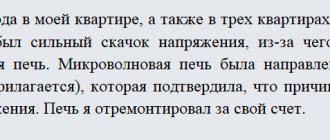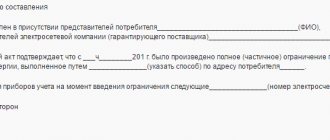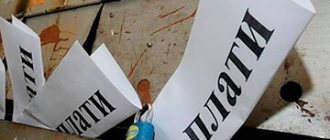Electricity in the 21st century is an attribute of a comfortable human life. Electricity powers household appliances, gadgets, and equipment, so its absence for a person becomes a phenomenon equivalent to a disaster. You have to pay for the use of these benefits, because otherwise there is a risk of being disconnected from the power grid, and therefore from civilization.
For a week of non-payment, the network organization will not take such drastic measures, but if you neglect the obligation to pay for a long time, then shutdown cannot be avoided. There is a core of legal acts that regulate the housing and communal services sector. The main requirement for implementing organizations (suppliers) is high-quality and uninterrupted supply of energy. In turn, apartment owners (consumers of the service) must pay for the supplied electricity on time and in full.
Resource supply organizations cannot refuse to provide electricity without compelling reasons, but for debts they have every right to limit and even suspend the supply of electricity to the debtor.
Grounds for power outages
The activities of management companies and resource supply organizations are regulated by legislative acts. The law requires not only high-quality service to consumers, but also eliminates any possibility of unauthorized power outages.
The acts that regulate relations between suppliers and consumers include:
- Government Decree No. 354 “On the provision of public services”;
- Government Decree No. 624 “on issues of complete / partial limitation of electricity consumption”;
- Government Decree No. 354 “On the provision of public services”;
According to PP No. 354, it is possible to turn off the lights without notifying consumers first if:
- an emergency has occurred;
- in case of emergency or natural disasters;
- An illegal connection to intra-house networks was detected;
- the poor condition of in-house utility networks or in-apartment equipment has been identified.
Warning power outages are allowed only in 2 cases:
- scheduled maintenance or repairs will be carried out;
- the utility is not fully paid for by the user.
Incomplete payment implies a debt of more than 2 monthly payments, calculated on the basis of light consumption standards. Thus, there is no specific amount of debt at which the electricity shutdown procedure will be launched.
What other penalties are there for non-payment?
Shutting off electricity is one of the measures to combat non-payers for utility services. Other measures may also apply to them:
- Peni . For non-payment of any of the housing and communal services, the contractor has the right to charge penalties. It is accrued after 90 days, during which debts accumulated. This means that from the 91st day an amount of 1/130 of the refinancing rate established by the Central Bank of the Russian Federation will be accrued daily. You can check the calculation of charges in a convenient online calculator.
- Eviction . Applies only to those residents who occupy municipal housing space on the basis of a social tenancy agreement and have not paid utility bills for more than six months. At the same time, if at least part of the payments are made or there are valid reasons, eviction is not applied. This measure can only be used on the basis of a court decision.
The owners of the premises can only be evicted by a court decision.
In general, it is impossible to disconnect a consumer from electricity for non-payment of other utility bills. The debt is calculated for each specific service and the measure of restriction or disconnection is applicable only for it. This means that if there is a water debt, only the water can be turned off.
If the consumer currently has a difficult financial situation that does not allow him to pay for electricity in full, he must contact the management company or the resource supplier (depending on who the contract for the supply of energy is concluded with) for an installment payment plan. Typically, such installments are provided for a period of six months. This will avoid a power outage in the apartment.
Procedure
So, there is a debt of more than 2 monthly payments. Consequently, the contractor (RSO, management company, HOA) has an obligation to take measures to turn off the electricity.
The procedure is as follows:
- The contractor sends a warning to the consumer about the upcoming restriction of the supply of public services. The notice can be given by letter, by e-mail, on the back of a payment order, by personal delivery to the debtor, through a personal account, or by telephone. The debtor is obliged to repay the debt within 20 days;
- if the money is not received, a repeated warning is sent that the supply of light will be suspended within 3 days;
- if within 10 days from the date of receipt of the second notice the debt is still not repaid, the apartment will be de-energized;
- The power supply is turned off by a RSO employee. A seal is placed on the meter and a report on the suspension of electricity supply must be drawn up. The act is drawn up in 3 copies: to the debtor, a representative of the RSO, a representative of the management company or the HOA. The act contains information about the debtor, information about the resource supplying organization, the grounds for turning off the power, the exact amount of debt, the date and time of the shutdown, the meter readings at the time of the shutdown and its serial number.
Where can I send a complaint?
In situations where a homeowners' association completely stops supplying electricity out of court , a citizen has the right to file a complaint with the Housing Inspectorate.
This body directly controls the activities of management organizations. The powers of the Housing Inspectorate stipulate the possibility of imposing penalties on HOAs.
In order for the appeal to have a result, it must be submitted to the head of the district department of the Inspectorate.
The standard content of a complaint is a description of the situation and a statement of the applicant’s demands.
The requirements in this case include an audit of the board’s actions to determine their legality in relation to a specific situation related to a power outage.
The requirements must include a request to initiate legal proceedings.
The result may be administrative or criminal liability for the management of the management organization.
There is the possibility of filing a parallel lawsuit, the purpose of which is to challenge the illegal actions of the utility service provider.
The claim may include a demand for compensation for moral damages for the homeowner.
When will the electricity be restored?
The lights will not be turned on until the debt is paid in full. However, the management company or RSO may enter into a position and allow the debt to be paid in installments. Installment plans allow you to pay off your debt in installments over six months.
If the debt is paid or the application for installment payment is satisfied, the consumer receives a document on the basis of which they will reconnect to the network. You will have to additionally pay for the services of an electrician who will remove the seals from the meter. According to PP No. 354, the costs of the contractor (RSO) for renewing the supply of electricity are reimbursed by the debtor in the amount of no more than 3,000 rubles. The provision of public services is resumed within 2 days from the date the cause of the outage is eliminated.
Types of debt and reasons for its occurrence
Conventionally, the following types of debt can be distinguished:
- Current – formed from the 1st to the 10th of the current month. In this case, no penalties are applied.
- Overdue – begins on the 11th day of the month following the reporting month.
- Up to three months – may be caused by unforeseen financial difficulties. No work is carried out with the defaulter at this stage, but penalties are charged.
- Up to a year – deliberate evasion of payment; a notification letter is sent to the defaulter.
- More than a year - it becomes problematic to repay the accumulated amount. The service provider may apply measures provided by law.
Citizens become debtors for various reasons. This may be a disproportionately low level of income, simple forgetfulness, incorrect calculation of payments, or a low level of awareness about the consequences of non-payment.
Actions in case of illegal disconnection
If the procedure for de-energizing the apartment was violated, you must contact representatives of the HOA or management company. A written request may be required and will take 20-30 days to process.
Of course, sitting without light all this time is problematic, so it’s better to get the electricity back right away. If you can’t reach an agreement, you should declare your readiness to file a complaint with the prosecutor’s office or court. Illegal blackouts are fully consistent with Article 330 of the Criminal Code on arbitrariness. Usually, after such statements, the contractor’s representatives are more willing to fulfill their responsibility to connect the light.
But you need to understand that the light will be returned and then turned off again, following the procedure. But there will be time to pay the debt or apply for an installment plan.
Does the HOA have the right to post lists of debtors?
In accordance with the Federal Law “On Personal Data”, as well as Art. 23 and art. 24 of the Constitution of the Russian Federation, any dissemination by third parties and organizations of information about a private person is a violation of the law.
Despite this, the legislation does not clarify the situation when the HOA posts a list indicating only apartment numbers and debt amounts. In this case, the personal data of the debtors or the involvement of specific individuals in the formation of debt is not publicly displayed.
Legal entities
In addition to citizens, legal entities are also consumers of electricity. In this case, the relationship between the parties is governed by the terms set out in the contract, and the procedure for their termination becomes simpler. The supplier may give notice of interruption of electricity supply by:
- Sending a postal item with notification of receipt;
- Submitting a claim to the bank servicing the defaulter’s accounts;
- Placing a corresponding warning in the user’s personal account on the electricity supplier’s portal;
- Delivery to the responsible representative of the client against signature.
The legislation provides for 2 options for stopping the supply of electricity: temporary shutdown for a certain period with sealing of metering devices and final termination of contractual relations.
Partnership and direct settlements with energy sales
If the subscriber pays for energy supply services directly to the supplying organization, without the mediation of the HOA, the latter cannot interfere with the payment procedure or take any measures in relation to the recipient of the services.
In this case, there are direct relations between citizens and the energy supply organization, regulated by Part 1. Article 540 of the Civil Code. If the supply of other utilities is carried out by the HOA, then even if there are significant debts for other types of services, the organization does not have the right to limit the energy supply to the consumer as a deterrent measure.
However, the law provides for cases in which the HOA has the right to disconnect subscribers from the power supply without written warnings:
- in the event of emergency situations on communication networks or the threat of their occurrence;
- in conditions of emergency or natural disaster.
Providing an act according to the law
A large number of regulations have been created specifically for housing and communal services authorities, with the help of which companies control the provision of services to citizens. For housing and communal services, it is necessary to send the appropriate payment monthly, otherwise the supply of resources will stop. However, RSO can carry out such an operation only by law.
Supply organizations can completely turn off or suspend the supply of electricity to a certain home only for compelling reasons. The Government of the Russian Federation has established specific cases when a company has every right to stop the supply of electricity or temporarily limit it.
There are PP numbers 354 and 442. The documents indicate that resource supply enterprises engaged in the supply of services have a legal basis:
- stop supply completely;
- pause for a while.
Sanctions will follow if the citizen refuses or is unable to pay the monthly fee.
The home electricity supplier is an organization that has entered into a formal resource supply agreement. All necessary documents for an apartment building are drawn up with the management company. If a person lives in private property, then for services they should contact the RSO directly. If various problems arise, these organizations must be contacted first to restore the power supply.
Arbitrage practice
In practice, the debtor becomes more conscious only after receiving the statement of claim. As a rule, in most cases the issue is resolved pre-trial. Usually, if the defaulter does not make contact before the court hearing, then he will not appear on the court day.
In such cases, the court makes a judgment in absentia. Then the defendant is notified of the result of the consideration of the case in writing. As a result, his property may be seized or the court may prohibit him from performing certain actions.
If you have any difficulties or questions, please seek legal advice. You can get free legal assistance on our website. in a special window.
Now you know whether the HOA has the right to turn off electricity for rent arrears and in what cases this is possible. If the actions of the HOA are unlawful, go to court. We recommend that you consult with a lawyer first.










